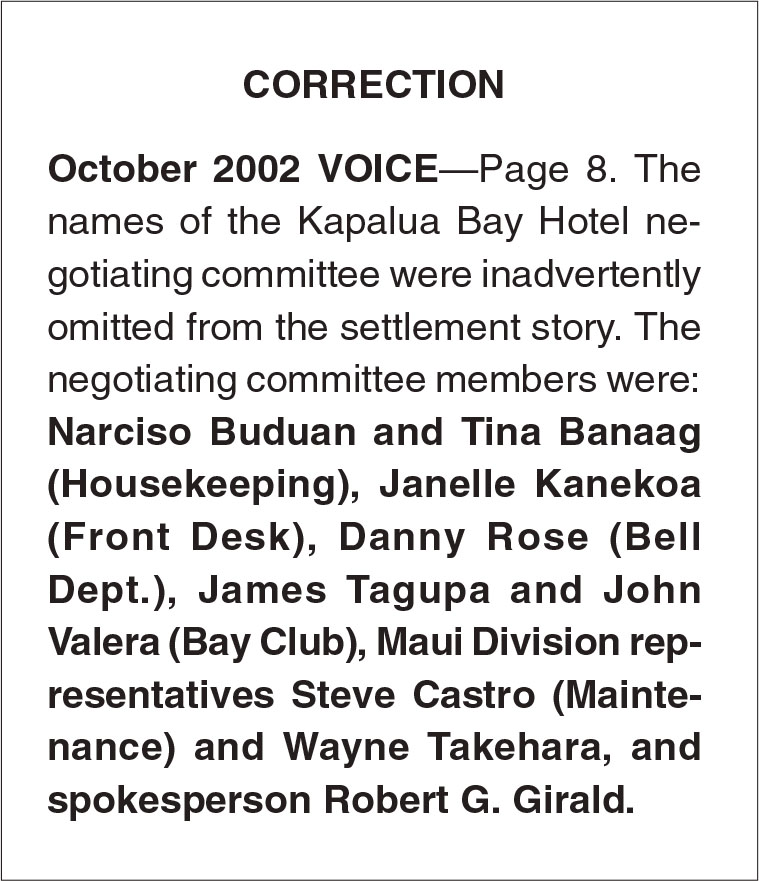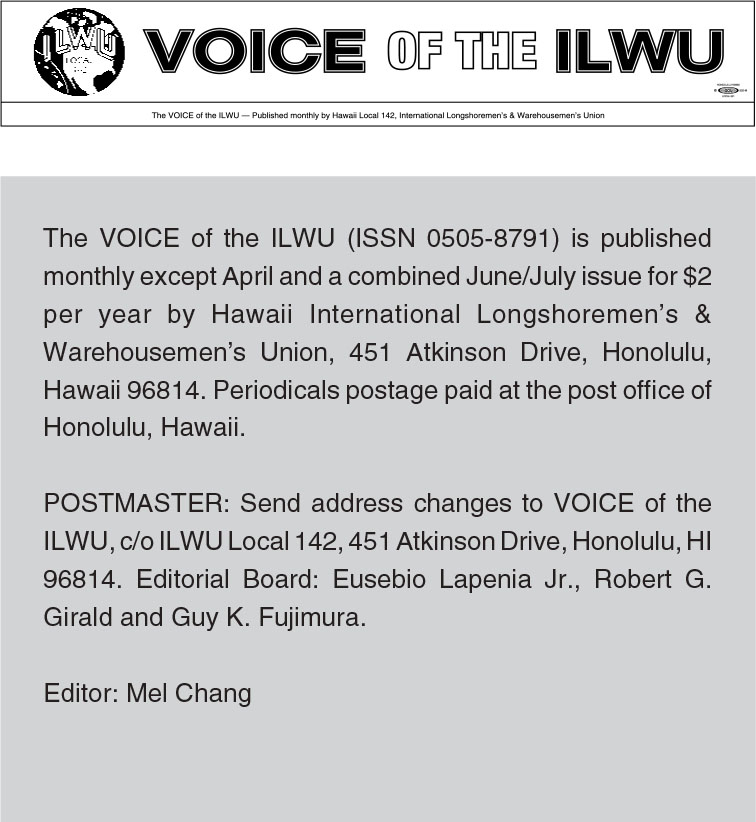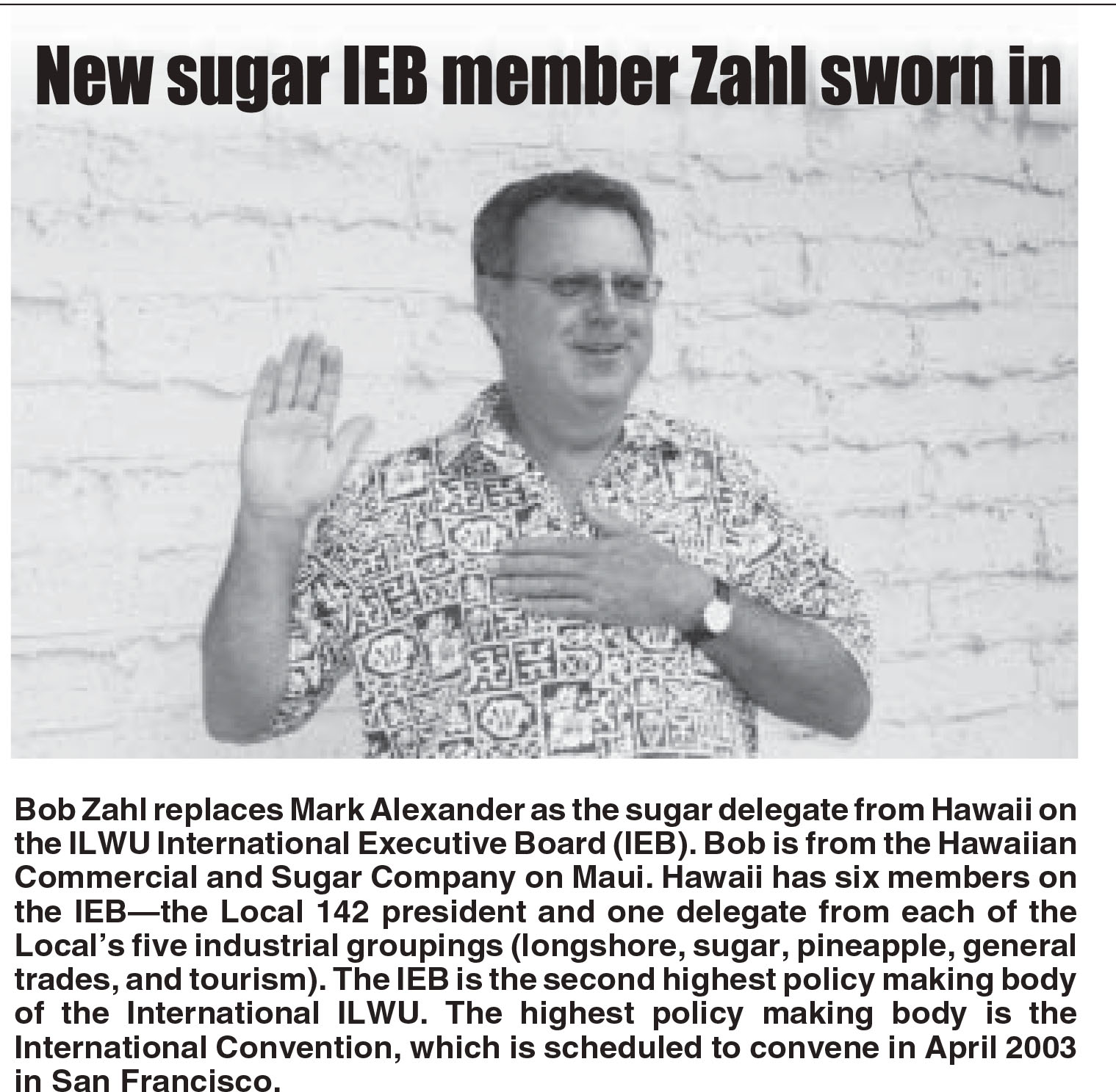Members to make final contract decision
SAN FRANCISCO—Meeting in caucus, ILWU longshore delegates overwhelmingly approved the contract agreement reached between the union and the Pacific Maritime Association (PMA) late November. The caucus, a representative assembly of delegates from all locals on the West Coast, reviewed each section of the agreement in detail, questioning the Negotiating Committee and seeking clarifications. After an exhaustive debate the caucus voted on December 12, 2002, by a 92.4 percent margin to recommend that the membership ratify it.
Members have final say
The agreement must now be approved by the West Coast longshore membership. All ILWU
Class A and Class B registeredl ongshore workers and maritime clerks will have the opportunity to vote on the contract by a secret ballot vote in January 2003.
Longshore members in Hawaii will not be part of this vote, as they have separate contracts with Hawaii stevedoring employers. Negotiations on the Hawaii contract is on-going and, like the West Coast, Hawaii longshore members will have the final vote on any agreement reached.
On the mainland
In late December, union officers will tour the West Coast, attending membership meetings to present the contract and answer
questions. Members will then have several weeks to discuss and decide on the agreement. Balloting will take place in all
longshore and clerk locals from Monday, Jan. 6, 2003 through Monday Jan. 13, 2003. For those locals that vote by mail, the locals will mail ballots to their members no later than Friday, Dec. 20, 2002. Members’ ballots must be received by the locals no later than Wednesday, Jan. 15, 2003. Locals must return their ballots to the International no later than Saturday, Jan. 18, 2003. The Coast Balloting Committee will meet Friday, Jan. 24, 2003 to count the ballots and announce the results.

The contract needs a simple majority to pass. But to protect the various interests within the ILWU Longshore Division, the locals are broken down into 10 units for the purposes of voting on the contract. The larger locals (Local 13 in Southern California, Local 63 in Southern California, Local 10 in Northern California, Local 8 in Portland, Local 23 in Tacoma and
Local 19 in Seattle) each constitute its own unit. The other units are comprised of the clerks’ locals in Northern California, Oregon and Washington, the small ports in California, the small ports in Oregon and the small ports in Washington. If any of these units vote less than 50 percent plus one, that constitutes a veto. Should that occur, an overall vote of 60 percent plus one is required for the contract to be approved.

Victory for longshore workers
“I’ve said it before and I’ll say it again–this landmark agreement is a victory for longshore workers, their families and our national economy. We have secured pension and economic security and strong health care benefits and safety protections while also taking concrete steps to modernize our ports,” said James Spinosa, ILWU International President. “ I applaud the Caucus for their deliberative and decisive action. I am proud that our union remains true to its democratic roots and provides a forum for serious discussion and debate.”
“Given the forces lined up against us—being locked out by our employer and having the Taft-Hartley injunction placed
upon us, we didn’t just survive to fight another day, we came out with a contract any union wouldbe proud to achieve,” Spinosa said. “We beat back attempts to slash our health care coverage and succeeded in gaining pension raises for our retirees and widows. The Caucus recognized that this is truly an historic contract and we are urging all ILWUmembers to vote for ratification.”
Pension protection
As part of the technology agreement reached with the PMA, the ILWU secured critical pension protection for its workers and
retirees. Given the dangerous nature of longshore work, pension security has historically been a top priority for the union. This agreement takes the cost savings that will be achieved through the technology improvements to provide solid pension protection for ILWU members and their families.
Other important provisions of the agreement include secure health benefits, improved wages, and important new safety provisions to protect workers on the docks. Strengthening safety conditions is a critical issue for longshore workers as they engagein the country’s second most hazardous profession.
The six-year contract will bring much needed stability to not onlythe shipping industry, but also to longshore workers and their families. This stability will strengthen the industry and make sure that longshore workers have the pension, health and economic security they deserve.
“The action by this Caucus is yet another example that collective bargaining works, “ Spinosa added. “It’s a process that has
proven successful for more than 60 years in the West Coast longshore industry.”

Bob Zahl replaces Mark Alexander as the sugar delegate from Hawaii on the ILWU International Executive Board (IEB). Bob is from the Hawaiian Commercial and Sugar Company on Maui. Hawaii has six members on the IEB—the Local 142 president and one delegate from each of the Local’s five industrial groupings (longshore, sugar, pineapple, general trades, and tourism). The IEB is the second highest policy making body of the International ILWU. The highest policy making body is the International Convention, which is scheduled to convene in April 2003 in San Francisco.
